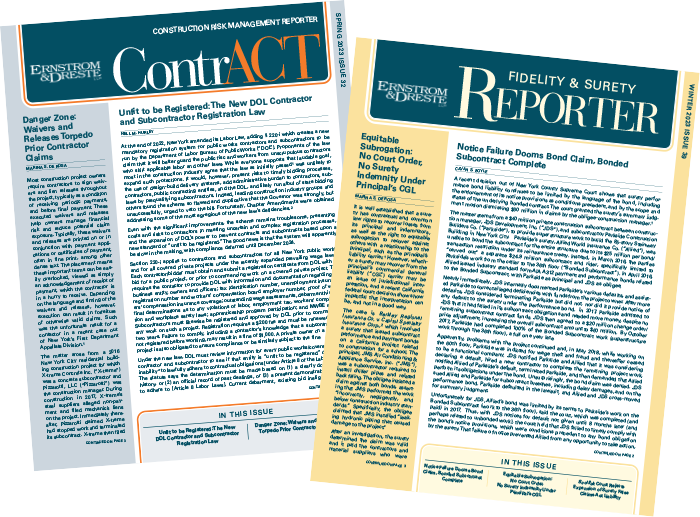Article by: Cavan S. Boyle
A New York appellate court recently confirmed that surety performance bond liability is limited by the language of the bond, including notice and termination “conditions precedent” provisions, and by the scope and status of the underlying bonded work.1 By affirming the lower court’s decision dismissing the obligee-construction manager’s $60 million claim against the surety, the court reiterates that a performance bond is not insurance against the cost of any breach, but rather, a guarantee of the principal’s performance of the bonded work only.
The matter stems from a $40 million private construction subcontract between construction manager, JDS Development, LLC (“JDS”), and subcontractor Parkside Construction Builders Corp. (“Parkside”), to provide superstructure work to build the 85-story Steinway Building in New York City. Parkside’s surety, Allied World Insurance Co. (“Allied”), could not bond the entire subcontract work due to a $25 million per bond/transaction restriction under its reinsurance treaty. Instead, in March 2016, the parties “carved out” a separate $24.9 million subcontract and rider limited to Parkside’s work from the superstructure to the 36th floor (“Bonded Subcontract”). In April 2016, Allied issued an industry standard form AIA A312™ (2010) performance bond covering the Bonded Subcontract, with Parkside as principal and JDS as obligee.
Nearly immediately, Parkside struggled, and JDS assisted Parkside to correct deficiencies with funds from the project owner. After more defaults, JDS considered terminating Parkside but did not, nor did JDS notify Allied of Parkside’s defaults pursuant to the bond. In early 2017, while failing its subcontract obligations, Parkside asked for more money, despite no remaining subcontract funds. JDS agreed to a $20 million change order/price adjustment, increasing the overall subcontract to $60 million. By October 2017, Parkside completed 100% of the Bonded Subcontract work (superstructure through the 36th floor), a full one year late.
Problems with the project continued and, in May 2018, while working on the 60th floor, Parkside was indicted for wage theft and fraud and abandoned the project. For the first time, JDS notified Parkside and Allied that it was considering declaring default and requested a conference to discuss methods of completing the remaining work. Soon after, JDS declared Parkside in default and terminated the subcontract. Asserting compliance with the bond’s notice and termination provisions, JDS demanded that Allied fulfill its bond obligations. Allied denied JDS’s claim. JDS sued Allied and Parkside for subcontract breaches, including delay damages, and on the performance bond. Parkside defaulted in the lawsuit, and Allied and JDS cross-moved for summary judgment, resulting in judgment on both motions in Allied’s favor.
At issue on appeal, explained the court, is the A312 bond, “one of the clearest, most definitive, and widely used…common law performance bonds in private construction” that “was developed to define clearly…the trigger of the surety’s obligation to perform.” Found under paragraph 3 of the A312 bond are terms that “create mandatory conditions precedent”, such that failure to adhere to the notice and termination requirements precludes surety liability under the bond.
Thus, the court affirmed that Allied’s bond was limited to Parkside’s work from the superstructure through the 36th floor only, which Parkside completed (and was paid for) in 2017. Only after Parkside completed the bonded work did JDS attempt to comply with the bond’s notice terms. JDS’s failure to invoke its rights while the bonded work was still in progress prevented Allied from any opportunity to perform, and JDS’s inaction was fatal to its claim.2 The court rejected Parkside’s argument that the provisions were not conditions precedent because the damages sought were “delay” damages.
The appellate court recognized that JDS may have made the correct business decision to keep a deficient contractor on the job instead of hiring a new one. But its failure to follow the bond’s notice and termination terms while the bonded work was in progress discharged the surety’s bond obligations. Unfortunately for JDS, the work beyond the Bonded Subcontract (above the 36th floor) was performed unbonded and without the protection of a surety bond or subcontractor default insurance.
- JDS Dev. LLC v. Parkside Const. Builders Corp., 2024 WL 3817696 [1st Dept 2024].
- See also 153 Hudson Dev., LLC v. DiNunno, 8 AD3d 77 [1st Dept 2004].





